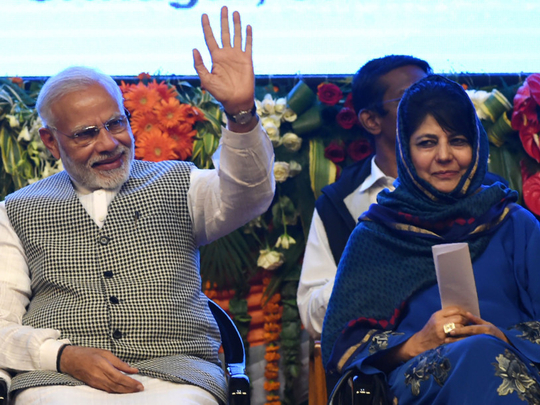
The state of Jammu and Kashmir in India entered a radical phase of uncertainty after the 2014 Assembly elections. The election results threw up a fragmented mandate and an uneven vote share, which saw the regional Jammu and Kashmir People’s Democratic Party (PDP) and India’s ruling national Bharatiya Janata Party (BJP), coming together in an alliance for the sake of government formation.
But, this alliance did not go down well with the people of the valley who had been asked to resist the BJP’s foray into Jammu and Kashmir, especially in the Kashmir division of the state. The bitterness and frustration of the electorate at what they saw as a grand betrayal by the PDP was followed by the killing of Burhan Wani, a young militant commander, which threw Kashmir into a series of protests and street violence that lasted for months. Notwithstanding the larger political conflict in Kashmir, the recent deteriorating situation in Kashmir can also be alluded to the PDP’s opportunistic alliance with the BJP.
Over the last few years, Kashmir has witnessed a steady slide into violence of a nature whose end point can neither be foretold nor fully known. Young Kashmiris, the actual core constituency of the region, are not only disenchanted with politics but their mood is decidedly anti-political. The most effective indicator of this is the growing number of young, educated men willingly and eagerly joining militant ranks.
The growing alienation among Kashmiri youth has not helped matters either. These trends, encapsulated by the recent joining and subsequent killing of Mohammad Rafi, a Kashmir university assistant professor, suggest and negate the oft-repeated assessments that lack of opportunity leads young men toward militancy. The professor, who was killed soon after joining a militant group, had not only a great life ahead of him but also plenty of opportunities in his chosen field of specialisation. Yet, he chose to pay the ultimate price.
If nothing, this development of the educated young men choosing to join militancy should alert us. This is alarming because once the space for politics shrinks and the mood of rejection grows, the conflict can only intensify. The need of the hour is to a salvage plan in Kashmir.
It can neither be done through month-long ceasefires nor governance measures. The prerequisite is to understand and view Kashmir as a political issue. Following this, a genuine outreach to all stakeholders must be undertaken. This would, obviously include Pakistan and other stakeholders in Kashmir to build a consensus. Any unilateral step would not only mean disaster but also would undercut conflict resolution efforts.
A genuine dialogic approach, instead of a confrontational one, should form the core of this resolution.
The ruling BJP and its leadership must understand that getting bogged down in a long-drawn conflict where there are no clear winners or losers, is not good politics. The party has a mandate and because of this, it can release the country from the clutches of conflict and also create conditions for lasting peace in south Asia.
While this might not gel with the party’s ideological agenda, sometimes, for the greater good of the people, ideology needs to be shelved and wisdom made the primary consideration.
The Non-Initiation of Counter Insurgency Operations (NICO), widely known as the ‘Ramadan Ceasefire’, announced by the Government of India for the month of Ramadan in Kashmir Valley is being widely appreciated. However, everyone is asking: What then after this month?
Whatever the prime minister’s intent, his actions should speak louder. Given that the BJP is in a powerful position, I don’t think that the prime minister of India has to fear taking strong decisions. What we saw from him in his dealings with Pakistan just as he took over as the Prime Minister of India has been missing in his dealings with Jammu and Kashmir. We need that sort of out-of-the-box thinking with regard to the state.
The people of Kashmir have suffered and are suffering. It is the people of the state who are made to pay the price of a conflict that has larger connotations and has become larger than life now. Even though conditions in Kashmir have deteriorated and taken a turn for the worse, there could still be redemption and silver linings. These lie in the youth of Kashmir who need to be appreciated, with a life of dignity, free from conflict, made available for them.
But, the paradox is that for this to happen, the larger realities of Kashmir and the conflict must be understood, grasped and taken head on. Kashmir is at delicate crossroads and this needs to be understood by the leadership of India, Pakistan and Kashmir. The time is ripe for wise leadership to guide it to a destiny which its people deserve.
Tanvir Sadiq is a politician from India. He is the political adviser to Omar Abdullah, former chief minister of Jammu & Kashmir. Twitter @tanvirsadiq












